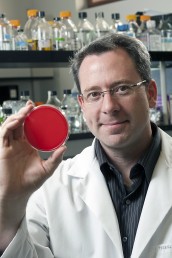UIC scientist fights war against bacteria
Michael Federle believes bacteria are smarter than many scientists give them credit for.
By studying quorum sensing — the means by which bacteria cells communicate with one another — Federle, assistant professor of medicinal chemistry and pharmacognosy at the University of Illinois at Chicago, is trying to convince sickness-causing microorganisms to remain in a nonhostile state.
Federle is one of 10 U.S.scientists to receive a five-year grant from the Burroughs Wellcome Fund that brings multidisciplinary approaches to the study of human infectious diseases. The program, based in Research Triangle Park, N. C., provides $500,000 to support accomplished investigators still early in their careers to study what happens at the points where human and microbial systems connect.
“We’re losing the war with bacteria,” Federle said. “Every antibiotic we’ve come up with has some level of resistance.”
Federle is studying the bacteria in streptococci, which are responsible for strep throat, cases of meningitis, bacterial pneumonia, endocarditis, erysipelas and the flesh-eating bacteria necrotizing fasciitis. His research explores ways to disrupt biofilms — communities of bacteria that live on a surface that are extremely resistant to antibiotics.
Manipulating bacteria that carry health complications is Federle’s long-term goal. Bacteria enter the body and grow quietly until reaching a certain population density to inflict damage, but quorum sensing can help ward off this illness-breeding form of bodily terrorism.
“If we can manipulate bacteria by understanding the chemical signals they use, then we can interfere with the bacteria’s ability to make people sick,” he said. “We’ll try to fool the bacteria by artificially stimulating them.”
When he learned he was a recipient of the Burroughs Wellcome grant, Federle said he was “flabbergasted,” especially considering the exceptional quality and impact of research being conducted by current and past awardees.
“I don’t consider this work. I’m having so much fun unraveling the basic nature of bacterial communication,” he said.
In addition to the Burroughs Wellcome award, Federle’s research is being funded through a grant from the National Institute of Health’s National Institute of Allergy and Infectious Diseases.
The Burroughs Wellcome Fund is a private independent non-profit foundation whose mission is to advance the medical sciences by supporting research and other educational activities. The awards are intended to give recipients the freedom and flexibility to pursue high-risk projects and new avenues of inquiry.

